Factors Contributing to Depression in International Students: A Study
VerifiedAdded on 2022/10/12
|8
|1783
|217
Essay
AI Summary
This essay examines the issue of depression among international students, particularly those studying in Canada. It explores the challenges these students face, including cultural shock, language barriers, social isolation, and financial hardships, which contribute to their mental health issues. The paper discusses the acculturation process and its impact on mental well-being, highlighting the role of social networks and cultural differences. It analyzes the need for social initiatives, such as stress management programs and mental health support services, to help students cope with these challenges. The essay concludes by emphasizing the importance of creating a supportive and inclusive environment to prevent depression and promote the overall well-being of international students, advocating for various approaches in teaching and providing quality information to make students equipped to avoid cultural shock.
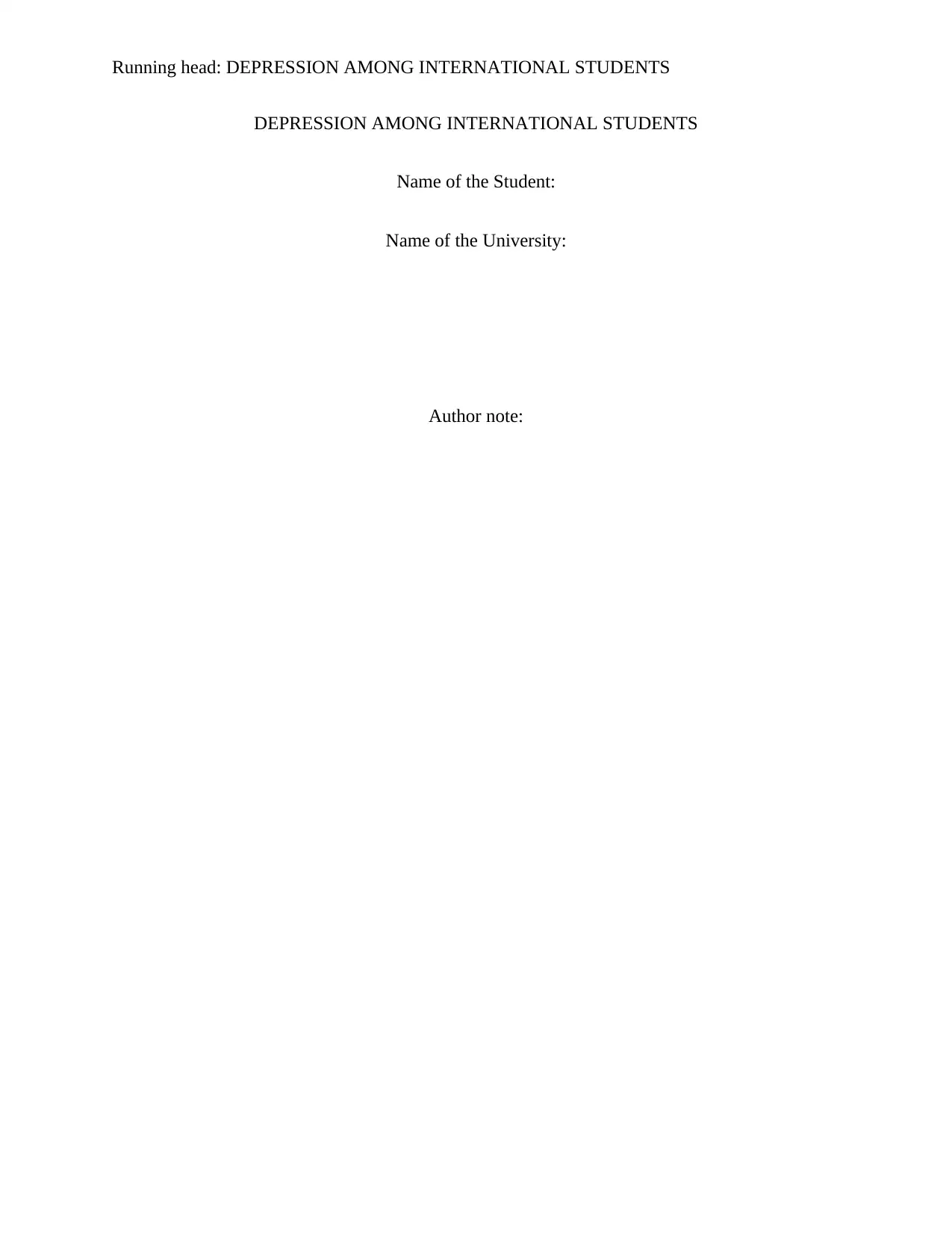
Running head: DEPRESSION AMONG INTERNATIONAL STUDENTS
DEPRESSION AMONG INTERNATIONAL STUDENTS
Name of the Student:
Name of the University:
Author note:
DEPRESSION AMONG INTERNATIONAL STUDENTS
Name of the Student:
Name of the University:
Author note:
Paraphrase This Document
Need a fresh take? Get an instant paraphrase of this document with our AI Paraphraser
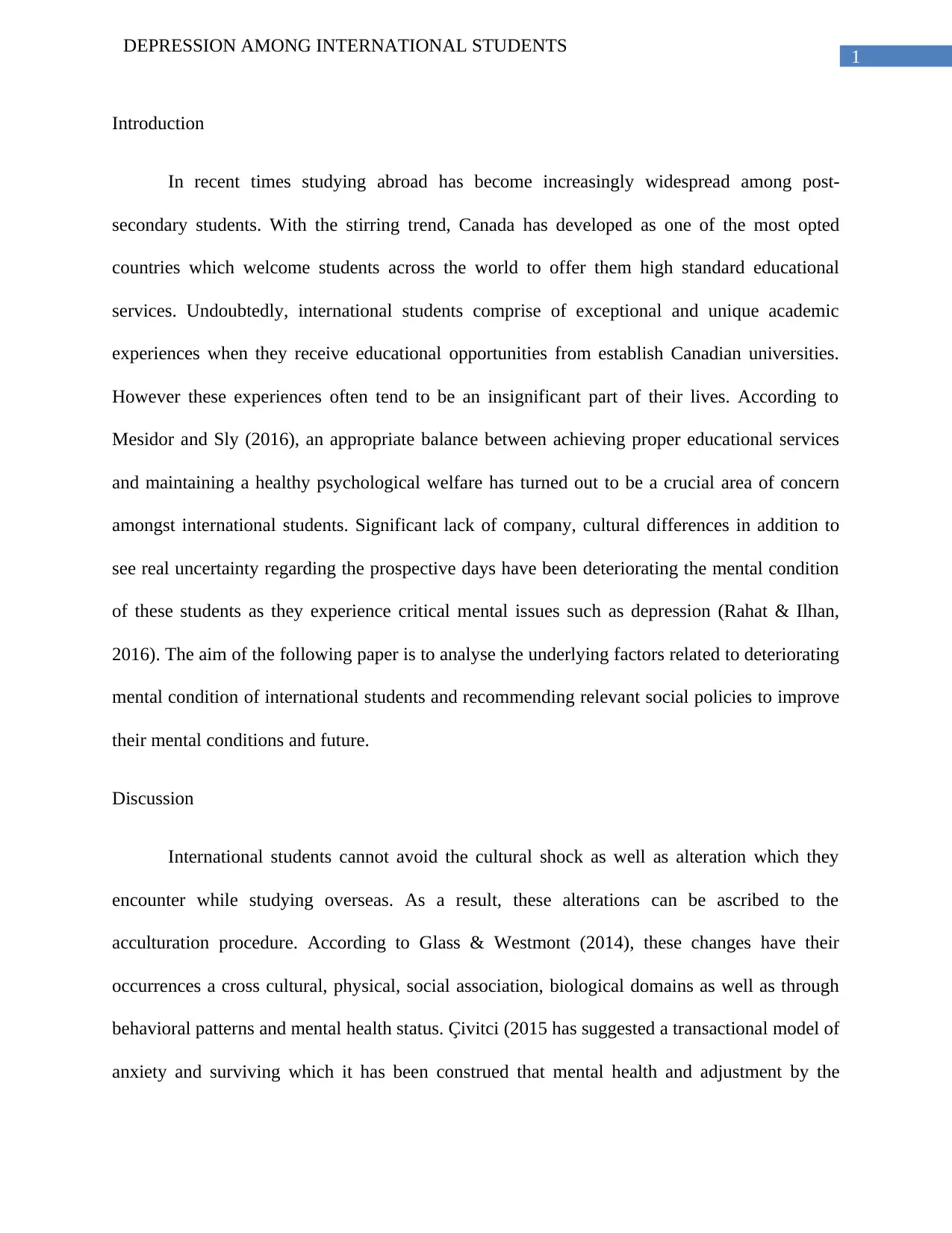
1
DEPRESSION AMONG INTERNATIONAL STUDENTS
Introduction
In recent times studying abroad has become increasingly widespread among post-
secondary students. With the stirring trend, Canada has developed as one of the most opted
countries which welcome students across the world to offer them high standard educational
services. Undoubtedly, international students comprise of exceptional and unique academic
experiences when they receive educational opportunities from establish Canadian universities.
However these experiences often tend to be an insignificant part of their lives. According to
Mesidor and Sly (2016), an appropriate balance between achieving proper educational services
and maintaining a healthy psychological welfare has turned out to be a crucial area of concern
amongst international students. Significant lack of company, cultural differences in addition to
see real uncertainty regarding the prospective days have been deteriorating the mental condition
of these students as they experience critical mental issues such as depression (Rahat & Ilhan,
2016). The aim of the following paper is to analyse the underlying factors related to deteriorating
mental condition of international students and recommending relevant social policies to improve
their mental conditions and future.
Discussion
International students cannot avoid the cultural shock as well as alteration which they
encounter while studying overseas. As a result, these alterations can be ascribed to the
acculturation procedure. According to Glass & Westmont (2014), these changes have their
occurrences a cross cultural, physical, social association, biological domains as well as through
behavioral patterns and mental health status. Çivitci (2015 has suggested a transactional model of
anxiety and surviving which it has been construed that mental health and adjustment by the
DEPRESSION AMONG INTERNATIONAL STUDENTS
Introduction
In recent times studying abroad has become increasingly widespread among post-
secondary students. With the stirring trend, Canada has developed as one of the most opted
countries which welcome students across the world to offer them high standard educational
services. Undoubtedly, international students comprise of exceptional and unique academic
experiences when they receive educational opportunities from establish Canadian universities.
However these experiences often tend to be an insignificant part of their lives. According to
Mesidor and Sly (2016), an appropriate balance between achieving proper educational services
and maintaining a healthy psychological welfare has turned out to be a crucial area of concern
amongst international students. Significant lack of company, cultural differences in addition to
see real uncertainty regarding the prospective days have been deteriorating the mental condition
of these students as they experience critical mental issues such as depression (Rahat & Ilhan,
2016). The aim of the following paper is to analyse the underlying factors related to deteriorating
mental condition of international students and recommending relevant social policies to improve
their mental conditions and future.
Discussion
International students cannot avoid the cultural shock as well as alteration which they
encounter while studying overseas. As a result, these alterations can be ascribed to the
acculturation procedure. According to Glass & Westmont (2014), these changes have their
occurrences a cross cultural, physical, social association, biological domains as well as through
behavioral patterns and mental health status. Çivitci (2015 has suggested a transactional model of
anxiety and surviving which it has been construed that mental health and adjustment by the
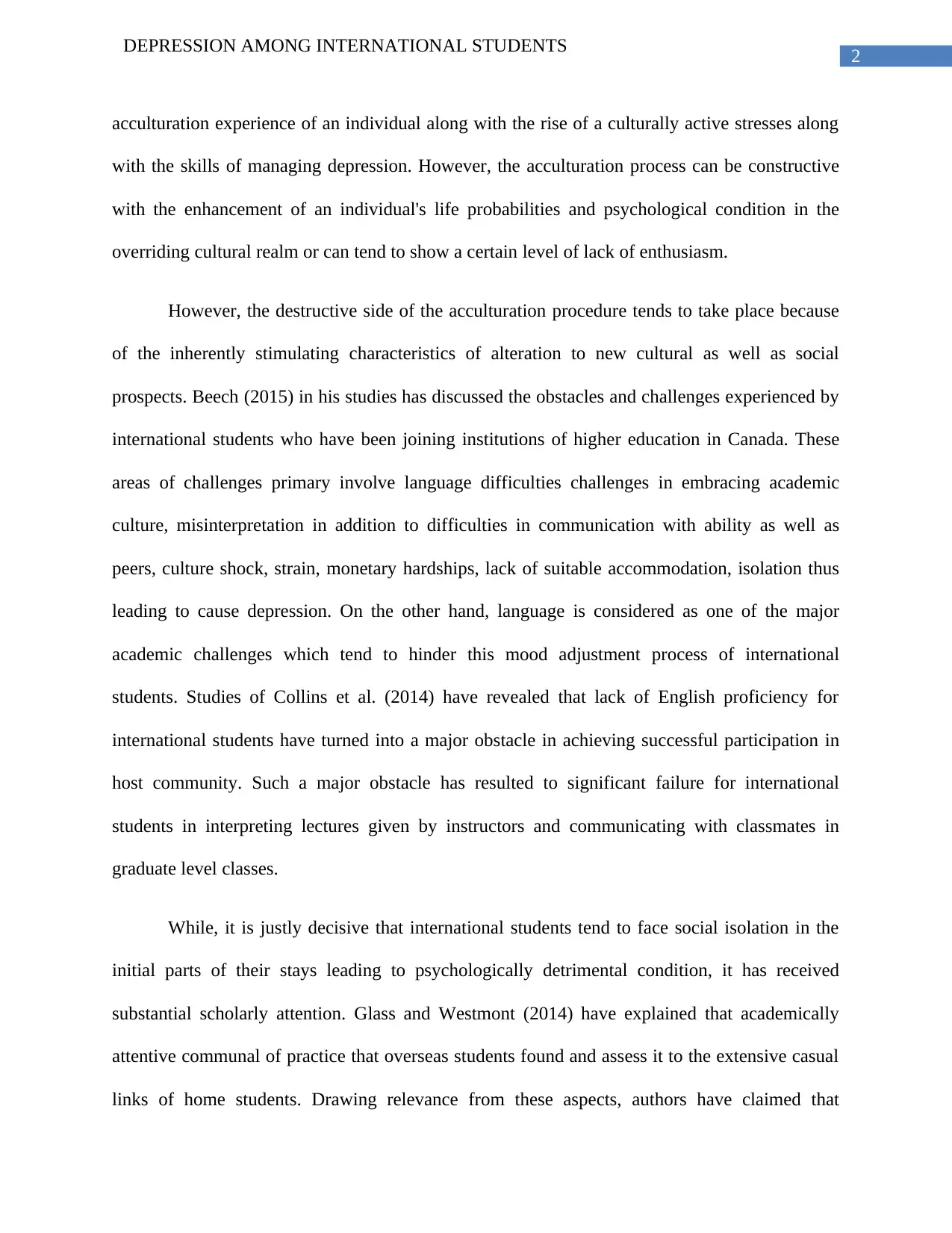
2
DEPRESSION AMONG INTERNATIONAL STUDENTS
acculturation experience of an individual along with the rise of a culturally active stresses along
with the skills of managing depression. However, the acculturation process can be constructive
with the enhancement of an individual's life probabilities and psychological condition in the
overriding cultural realm or can tend to show a certain level of lack of enthusiasm.
However, the destructive side of the acculturation procedure tends to take place because
of the inherently stimulating characteristics of alteration to new cultural as well as social
prospects. Beech (2015) in his studies has discussed the obstacles and challenges experienced by
international students who have been joining institutions of higher education in Canada. These
areas of challenges primary involve language difficulties challenges in embracing academic
culture, misinterpretation in addition to difficulties in communication with ability as well as
peers, culture shock, strain, monetary hardships, lack of suitable accommodation, isolation thus
leading to cause depression. On the other hand, language is considered as one of the major
academic challenges which tend to hinder this mood adjustment process of international
students. Studies of Collins et al. (2014) have revealed that lack of English proficiency for
international students have turned into a major obstacle in achieving successful participation in
host community. Such a major obstacle has resulted to significant failure for international
students in interpreting lectures given by instructors and communicating with classmates in
graduate level classes.
While, it is justly decisive that international students tend to face social isolation in the
initial parts of their stays leading to psychologically detrimental condition, it has received
substantial scholarly attention. Glass and Westmont (2014) have explained that academically
attentive communal of practice that overseas students found and assess it to the extensive casual
links of home students. Drawing relevance from these aspects, authors have claimed that
DEPRESSION AMONG INTERNATIONAL STUDENTS
acculturation experience of an individual along with the rise of a culturally active stresses along
with the skills of managing depression. However, the acculturation process can be constructive
with the enhancement of an individual's life probabilities and psychological condition in the
overriding cultural realm or can tend to show a certain level of lack of enthusiasm.
However, the destructive side of the acculturation procedure tends to take place because
of the inherently stimulating characteristics of alteration to new cultural as well as social
prospects. Beech (2015) in his studies has discussed the obstacles and challenges experienced by
international students who have been joining institutions of higher education in Canada. These
areas of challenges primary involve language difficulties challenges in embracing academic
culture, misinterpretation in addition to difficulties in communication with ability as well as
peers, culture shock, strain, monetary hardships, lack of suitable accommodation, isolation thus
leading to cause depression. On the other hand, language is considered as one of the major
academic challenges which tend to hinder this mood adjustment process of international
students. Studies of Collins et al. (2014) have revealed that lack of English proficiency for
international students have turned into a major obstacle in achieving successful participation in
host community. Such a major obstacle has resulted to significant failure for international
students in interpreting lectures given by instructors and communicating with classmates in
graduate level classes.
While, it is justly decisive that international students tend to face social isolation in the
initial parts of their stays leading to psychologically detrimental condition, it has received
substantial scholarly attention. Glass and Westmont (2014) have explained that academically
attentive communal of practice that overseas students found and assess it to the extensive casual
links of home students. Drawing relevance from these aspects, authors have claimed that
⊘ This is a preview!⊘
Do you want full access?
Subscribe today to unlock all pages.

Trusted by 1+ million students worldwide
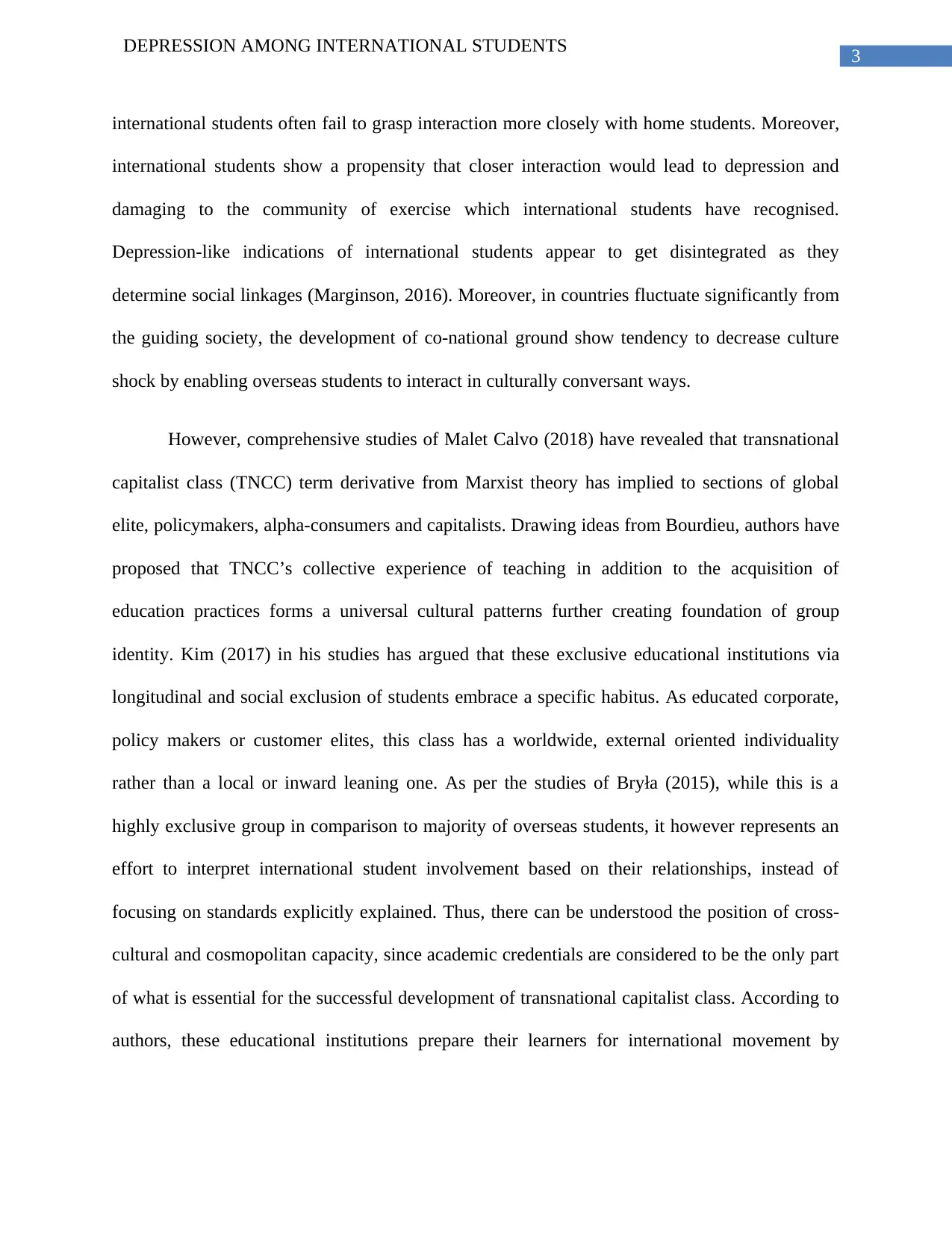
3
DEPRESSION AMONG INTERNATIONAL STUDENTS
international students often fail to grasp interaction more closely with home students. Moreover,
international students show a propensity that closer interaction would lead to depression and
damaging to the community of exercise which international students have recognised.
Depression-like indications of international students appear to get disintegrated as they
determine social linkages (Marginson, 2016). Moreover, in countries fluctuate significantly from
the guiding society, the development of co-national ground show tendency to decrease culture
shock by enabling overseas students to interact in culturally conversant ways.
However, comprehensive studies of Malet Calvo (2018) have revealed that transnational
capitalist class (TNCC) term derivative from Marxist theory has implied to sections of global
elite, policymakers, alpha-consumers and capitalists. Drawing ideas from Bourdieu, authors have
proposed that TNCC’s collective experience of teaching in addition to the acquisition of
education practices forms a universal cultural patterns further creating foundation of group
identity. Kim (2017) in his studies has argued that these exclusive educational institutions via
longitudinal and social exclusion of students embrace a specific habitus. As educated corporate,
policy makers or customer elites, this class has a worldwide, external oriented individuality
rather than a local or inward leaning one. As per the studies of Bryła (2015), while this is a
highly exclusive group in comparison to majority of overseas students, it however represents an
effort to interpret international student involvement based on their relationships, instead of
focusing on standards explicitly explained. Thus, there can be understood the position of cross-
cultural and cosmopolitan capacity, since academic credentials are considered to be the only part
of what is essential for the successful development of transnational capitalist class. According to
authors, these educational institutions prepare their learners for international movement by
DEPRESSION AMONG INTERNATIONAL STUDENTS
international students often fail to grasp interaction more closely with home students. Moreover,
international students show a propensity that closer interaction would lead to depression and
damaging to the community of exercise which international students have recognised.
Depression-like indications of international students appear to get disintegrated as they
determine social linkages (Marginson, 2016). Moreover, in countries fluctuate significantly from
the guiding society, the development of co-national ground show tendency to decrease culture
shock by enabling overseas students to interact in culturally conversant ways.
However, comprehensive studies of Malet Calvo (2018) have revealed that transnational
capitalist class (TNCC) term derivative from Marxist theory has implied to sections of global
elite, policymakers, alpha-consumers and capitalists. Drawing ideas from Bourdieu, authors have
proposed that TNCC’s collective experience of teaching in addition to the acquisition of
education practices forms a universal cultural patterns further creating foundation of group
identity. Kim (2017) in his studies has argued that these exclusive educational institutions via
longitudinal and social exclusion of students embrace a specific habitus. As educated corporate,
policy makers or customer elites, this class has a worldwide, external oriented individuality
rather than a local or inward leaning one. As per the studies of Bryła (2015), while this is a
highly exclusive group in comparison to majority of overseas students, it however represents an
effort to interpret international student involvement based on their relationships, instead of
focusing on standards explicitly explained. Thus, there can be understood the position of cross-
cultural and cosmopolitan capacity, since academic credentials are considered to be the only part
of what is essential for the successful development of transnational capitalist class. According to
authors, these educational institutions prepare their learners for international movement by
Paraphrase This Document
Need a fresh take? Get an instant paraphrase of this document with our AI Paraphraser
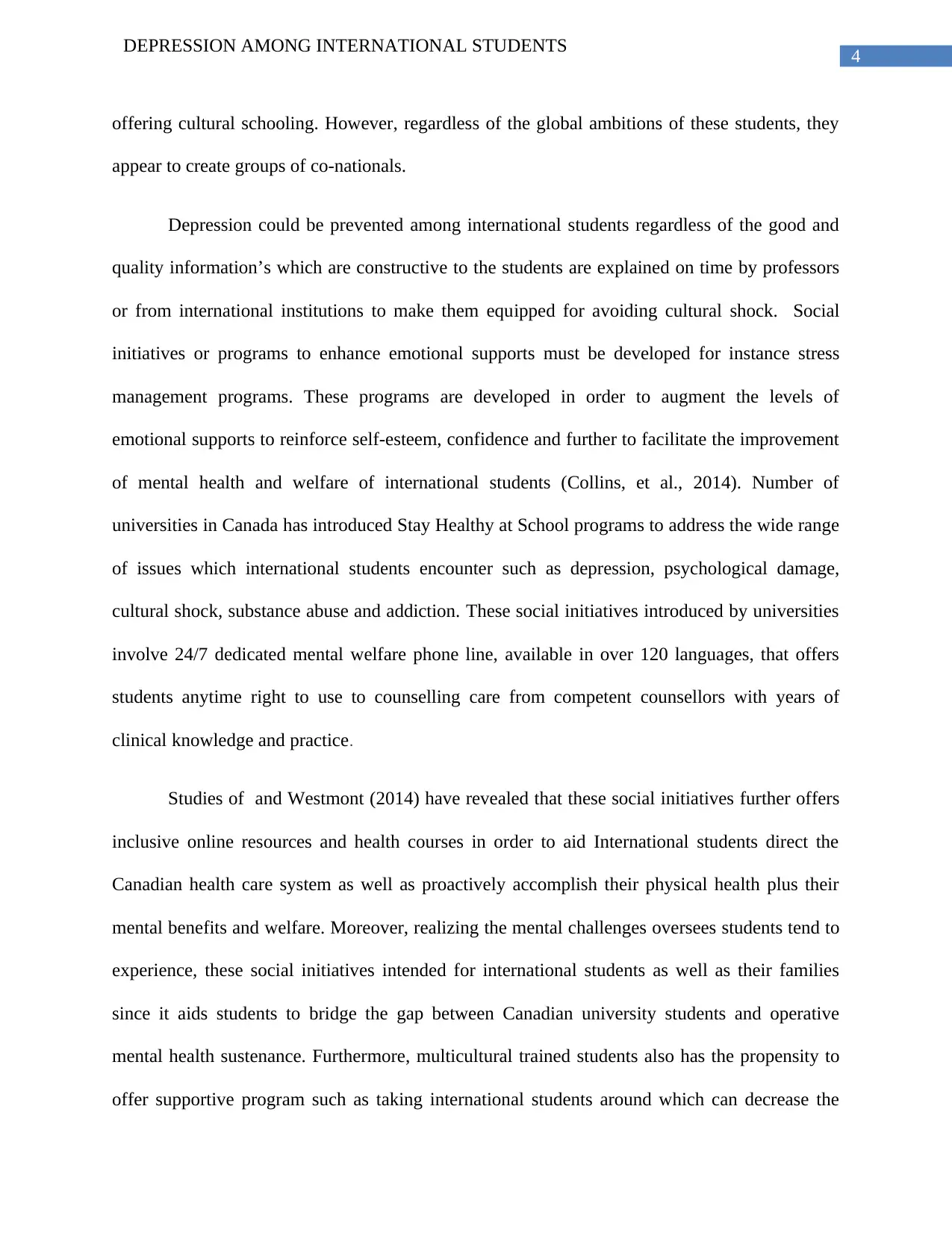
4
DEPRESSION AMONG INTERNATIONAL STUDENTS
offering cultural schooling. However, regardless of the global ambitions of these students, they
appear to create groups of co-nationals.
Depression could be prevented among international students regardless of the good and
quality information’s which are constructive to the students are explained on time by professors
or from international institutions to make them equipped for avoiding cultural shock. Social
initiatives or programs to enhance emotional supports must be developed for instance stress
management programs. These programs are developed in order to augment the levels of
emotional supports to reinforce self-esteem, confidence and further to facilitate the improvement
of mental health and welfare of international students (Collins, et al., 2014). Number of
universities in Canada has introduced Stay Healthy at School programs to address the wide range
of issues which international students encounter such as depression, psychological damage,
cultural shock, substance abuse and addiction. These social initiatives introduced by universities
involve 24/7 dedicated mental welfare phone line, available in over 120 languages, that offers
students anytime right to use to counselling care from competent counsellors with years of
clinical knowledge and practice.
Studies of and Westmont (2014) have revealed that these social initiatives further offers
inclusive online resources and health courses in order to aid International students direct the
Canadian health care system as well as proactively accomplish their physical health plus their
mental benefits and welfare. Moreover, realizing the mental challenges oversees students tend to
experience, these social initiatives intended for international students as well as their families
since it aids students to bridge the gap between Canadian university students and operative
mental health sustenance. Furthermore, multicultural trained students also has the propensity to
offer supportive program such as taking international students around which can decrease the
DEPRESSION AMONG INTERNATIONAL STUDENTS
offering cultural schooling. However, regardless of the global ambitions of these students, they
appear to create groups of co-nationals.
Depression could be prevented among international students regardless of the good and
quality information’s which are constructive to the students are explained on time by professors
or from international institutions to make them equipped for avoiding cultural shock. Social
initiatives or programs to enhance emotional supports must be developed for instance stress
management programs. These programs are developed in order to augment the levels of
emotional supports to reinforce self-esteem, confidence and further to facilitate the improvement
of mental health and welfare of international students (Collins, et al., 2014). Number of
universities in Canada has introduced Stay Healthy at School programs to address the wide range
of issues which international students encounter such as depression, psychological damage,
cultural shock, substance abuse and addiction. These social initiatives introduced by universities
involve 24/7 dedicated mental welfare phone line, available in over 120 languages, that offers
students anytime right to use to counselling care from competent counsellors with years of
clinical knowledge and practice.
Studies of and Westmont (2014) have revealed that these social initiatives further offers
inclusive online resources and health courses in order to aid International students direct the
Canadian health care system as well as proactively accomplish their physical health plus their
mental benefits and welfare. Moreover, realizing the mental challenges oversees students tend to
experience, these social initiatives intended for international students as well as their families
since it aids students to bridge the gap between Canadian university students and operative
mental health sustenance. Furthermore, multicultural trained students also has the propensity to
offer supportive program such as taking international students around which can decrease the
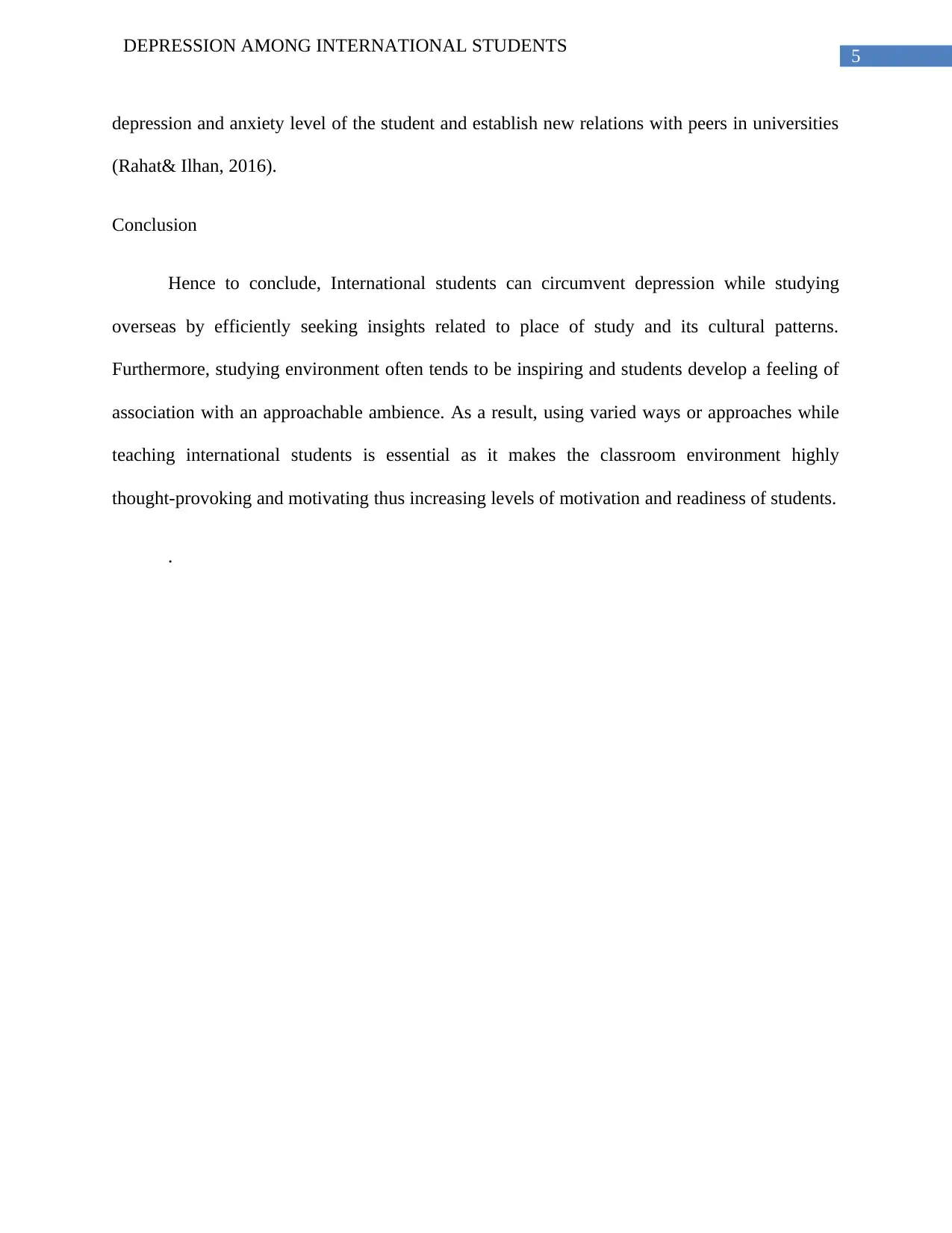
5
DEPRESSION AMONG INTERNATIONAL STUDENTS
depression and anxiety level of the student and establish new relations with peers in universities
(Rahat& Ilhan, 2016).
Conclusion
Hence to conclude, International students can circumvent depression while studying
overseas by efficiently seeking insights related to place of study and its cultural patterns.
Furthermore, studying environment often tends to be inspiring and students develop a feeling of
association with an approachable ambience. As a result, using varied ways or approaches while
teaching international students is essential as it makes the classroom environment highly
thought-provoking and motivating thus increasing levels of motivation and readiness of students.
.
DEPRESSION AMONG INTERNATIONAL STUDENTS
depression and anxiety level of the student and establish new relations with peers in universities
(Rahat& Ilhan, 2016).
Conclusion
Hence to conclude, International students can circumvent depression while studying
overseas by efficiently seeking insights related to place of study and its cultural patterns.
Furthermore, studying environment often tends to be inspiring and students develop a feeling of
association with an approachable ambience. As a result, using varied ways or approaches while
teaching international students is essential as it makes the classroom environment highly
thought-provoking and motivating thus increasing levels of motivation and readiness of students.
.
⊘ This is a preview!⊘
Do you want full access?
Subscribe today to unlock all pages.

Trusted by 1+ million students worldwide
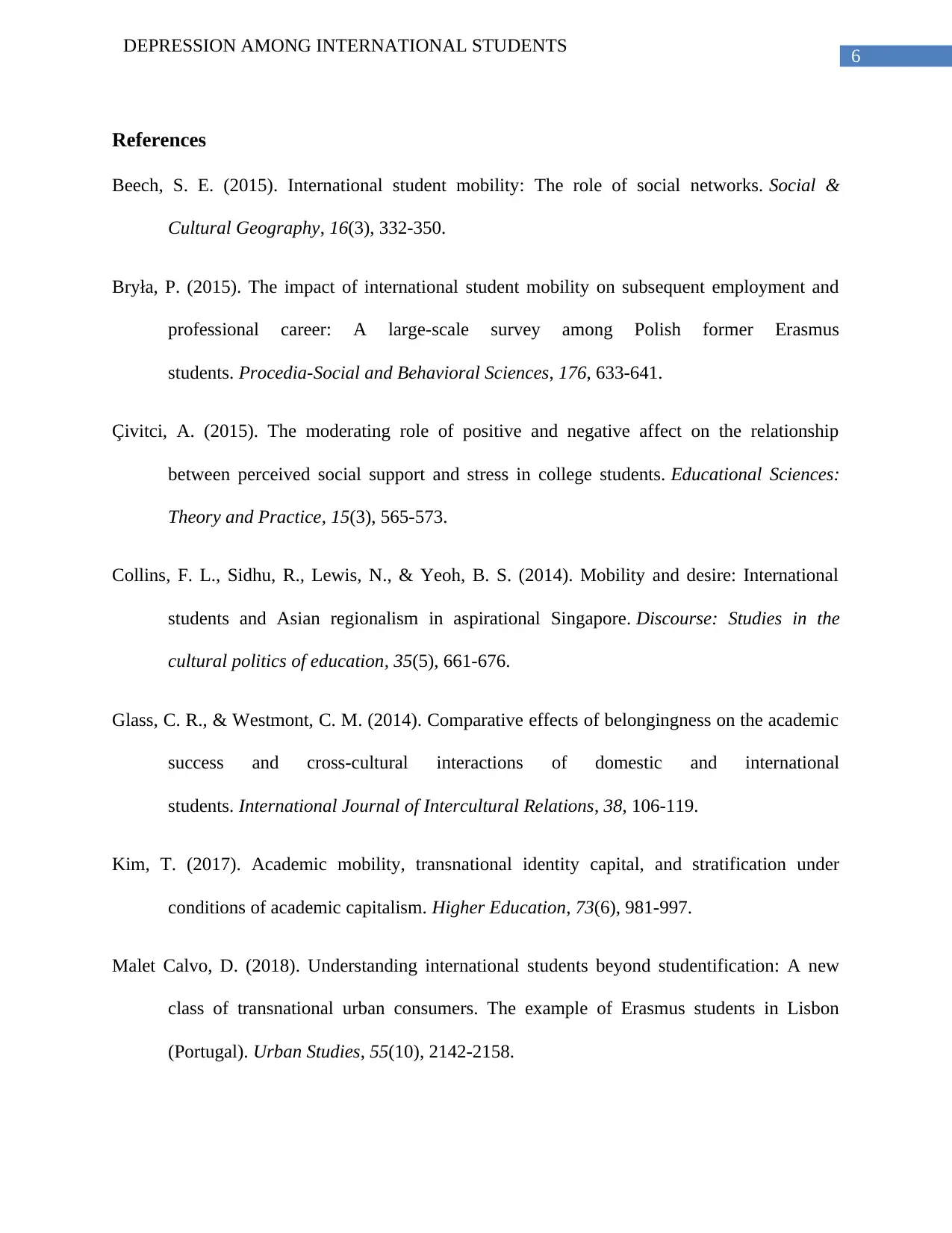
6
DEPRESSION AMONG INTERNATIONAL STUDENTS
References
Beech, S. E. (2015). International student mobility: The role of social networks. Social &
Cultural Geography, 16(3), 332-350.
Bryła, P. (2015). The impact of international student mobility on subsequent employment and
professional career: A large-scale survey among Polish former Erasmus
students. Procedia-Social and Behavioral Sciences, 176, 633-641.
Çivitci, A. (2015). The moderating role of positive and negative affect on the relationship
between perceived social support and stress in college students. Educational Sciences:
Theory and Practice, 15(3), 565-573.
Collins, F. L., Sidhu, R., Lewis, N., & Yeoh, B. S. (2014). Mobility and desire: International
students and Asian regionalism in aspirational Singapore. Discourse: Studies in the
cultural politics of education, 35(5), 661-676.
Glass, C. R., & Westmont, C. M. (2014). Comparative effects of belongingness on the academic
success and cross-cultural interactions of domestic and international
students. International Journal of Intercultural Relations, 38, 106-119.
Kim, T. (2017). Academic mobility, transnational identity capital, and stratification under
conditions of academic capitalism. Higher Education, 73(6), 981-997.
Malet Calvo, D. (2018). Understanding international students beyond studentification: A new
class of transnational urban consumers. The example of Erasmus students in Lisbon
(Portugal). Urban Studies, 55(10), 2142-2158.
DEPRESSION AMONG INTERNATIONAL STUDENTS
References
Beech, S. E. (2015). International student mobility: The role of social networks. Social &
Cultural Geography, 16(3), 332-350.
Bryła, P. (2015). The impact of international student mobility on subsequent employment and
professional career: A large-scale survey among Polish former Erasmus
students. Procedia-Social and Behavioral Sciences, 176, 633-641.
Çivitci, A. (2015). The moderating role of positive and negative affect on the relationship
between perceived social support and stress in college students. Educational Sciences:
Theory and Practice, 15(3), 565-573.
Collins, F. L., Sidhu, R., Lewis, N., & Yeoh, B. S. (2014). Mobility and desire: International
students and Asian regionalism in aspirational Singapore. Discourse: Studies in the
cultural politics of education, 35(5), 661-676.
Glass, C. R., & Westmont, C. M. (2014). Comparative effects of belongingness on the academic
success and cross-cultural interactions of domestic and international
students. International Journal of Intercultural Relations, 38, 106-119.
Kim, T. (2017). Academic mobility, transnational identity capital, and stratification under
conditions of academic capitalism. Higher Education, 73(6), 981-997.
Malet Calvo, D. (2018). Understanding international students beyond studentification: A new
class of transnational urban consumers. The example of Erasmus students in Lisbon
(Portugal). Urban Studies, 55(10), 2142-2158.
Paraphrase This Document
Need a fresh take? Get an instant paraphrase of this document with our AI Paraphraser
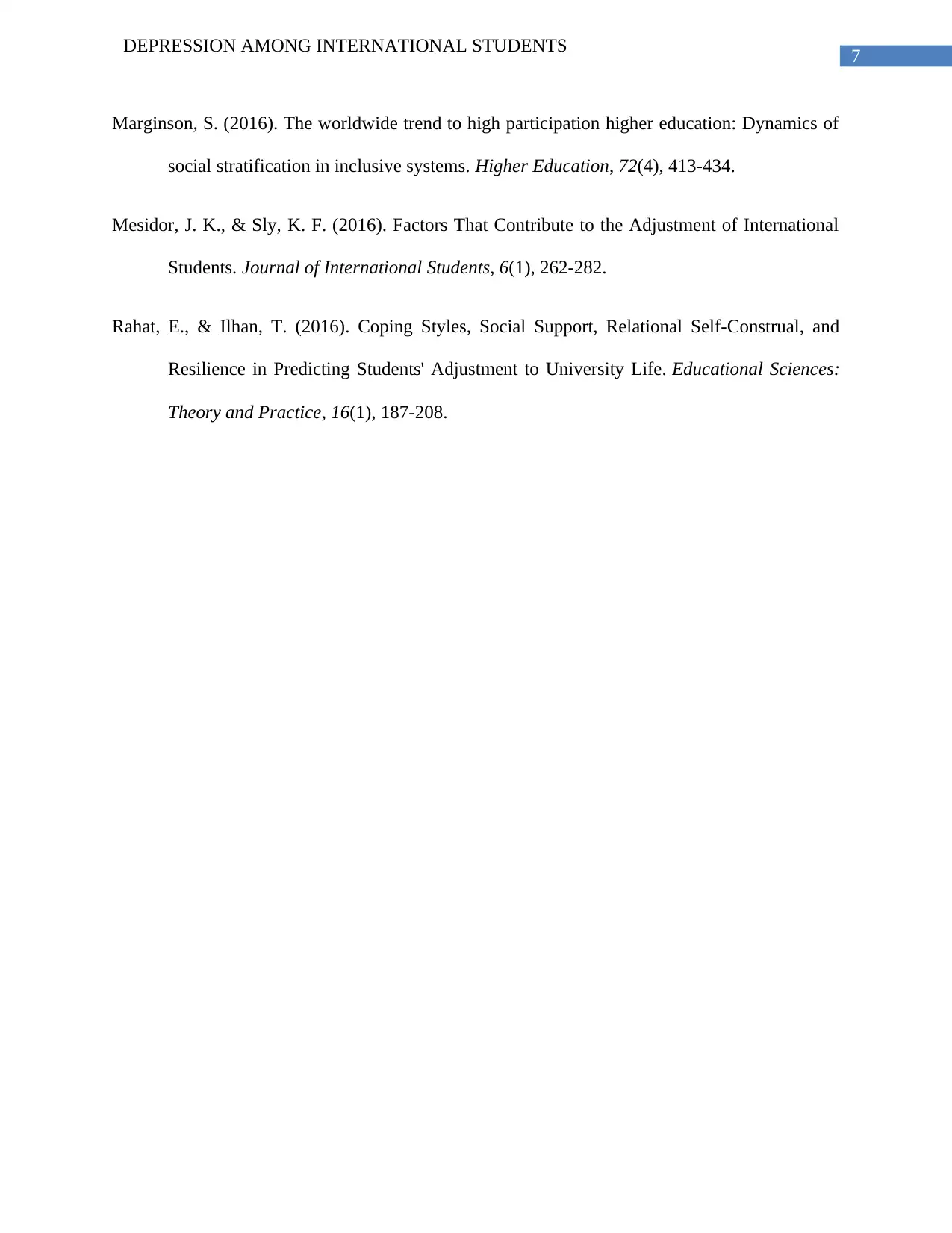
7
DEPRESSION AMONG INTERNATIONAL STUDENTS
Marginson, S. (2016). The worldwide trend to high participation higher education: Dynamics of
social stratification in inclusive systems. Higher Education, 72(4), 413-434.
Mesidor, J. K., & Sly, K. F. (2016). Factors That Contribute to the Adjustment of International
Students. Journal of International Students, 6(1), 262-282.
Rahat, E., & Ilhan, T. (2016). Coping Styles, Social Support, Relational Self-Construal, and
Resilience in Predicting Students' Adjustment to University Life. Educational Sciences:
Theory and Practice, 16(1), 187-208.
DEPRESSION AMONG INTERNATIONAL STUDENTS
Marginson, S. (2016). The worldwide trend to high participation higher education: Dynamics of
social stratification in inclusive systems. Higher Education, 72(4), 413-434.
Mesidor, J. K., & Sly, K. F. (2016). Factors That Contribute to the Adjustment of International
Students. Journal of International Students, 6(1), 262-282.
Rahat, E., & Ilhan, T. (2016). Coping Styles, Social Support, Relational Self-Construal, and
Resilience in Predicting Students' Adjustment to University Life. Educational Sciences:
Theory and Practice, 16(1), 187-208.
1 out of 8
Related Documents
Your All-in-One AI-Powered Toolkit for Academic Success.
+13062052269
info@desklib.com
Available 24*7 on WhatsApp / Email
![[object Object]](/_next/static/media/star-bottom.7253800d.svg)
Unlock your academic potential
Copyright © 2020–2026 A2Z Services. All Rights Reserved. Developed and managed by ZUCOL.




